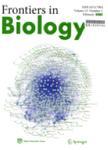RNA-binding proteins in pluripotency, differentiation, and reprogramming
RNA-binding proteins in pluripotency, differentiation, and reprogramming作者机构:The Black Family Stem Cell Institute Icahn School of Medicine at Mount Sinai New York NY 10029 USA Department of Developmental and Regenerative Biology Icahn School of Medicine at Mount Sinai New York NY 10029 USA The Graduate School of Biomedical Sciences Icahn School of Medicine at Mount Sinai New York NY 10029 USA
出 版 物:《Frontiers in Biology》 (生物学前沿(英文版))
年 卷 期:2014年第9卷第5期
页 面:389-409页
核心收录:
学科分类:0710[理学-生物学] 071010[理学-生物化学与分子生物学] 081704[工学-应用化学] 07[理学] 08[工学] 0817[工学-化学工程与技术] 09[农学] 071007[理学-遗传学] 0901[农学-作物学] 0836[工学-生物工程] 090102[农学-作物遗传育种]
基 金:funded by grants from the National Institutes of Health (NIH) the Empire State Stem Cell Fund through New York State Department of Health (NYSTEM)
主 题:RNA-binding protein embryonic stem cell pluripotency differentiation somatic cell reprogramming lncRNA
摘 要:Embryonic stem cell maintenance, differentiation, and somatic cell reprogramming require the interplay of multiple pluripotency factors, epigenetic remodelers, and extracellular signaling pathways. RNA-binding proteins (RBPs) are involved in a wide range of regulatory pathways, from RNA metabolism to epigenetic modifications. In recent years we have witnessed more and more studies on the discovery of new RBPs and the assessment of their functions in a variety of biological systems, including stem cells. We review the current studies on RBPs and focus on those that have functional implications in pluripotency, differentiation, and/or reprogramming in both the human and mouse systems.



